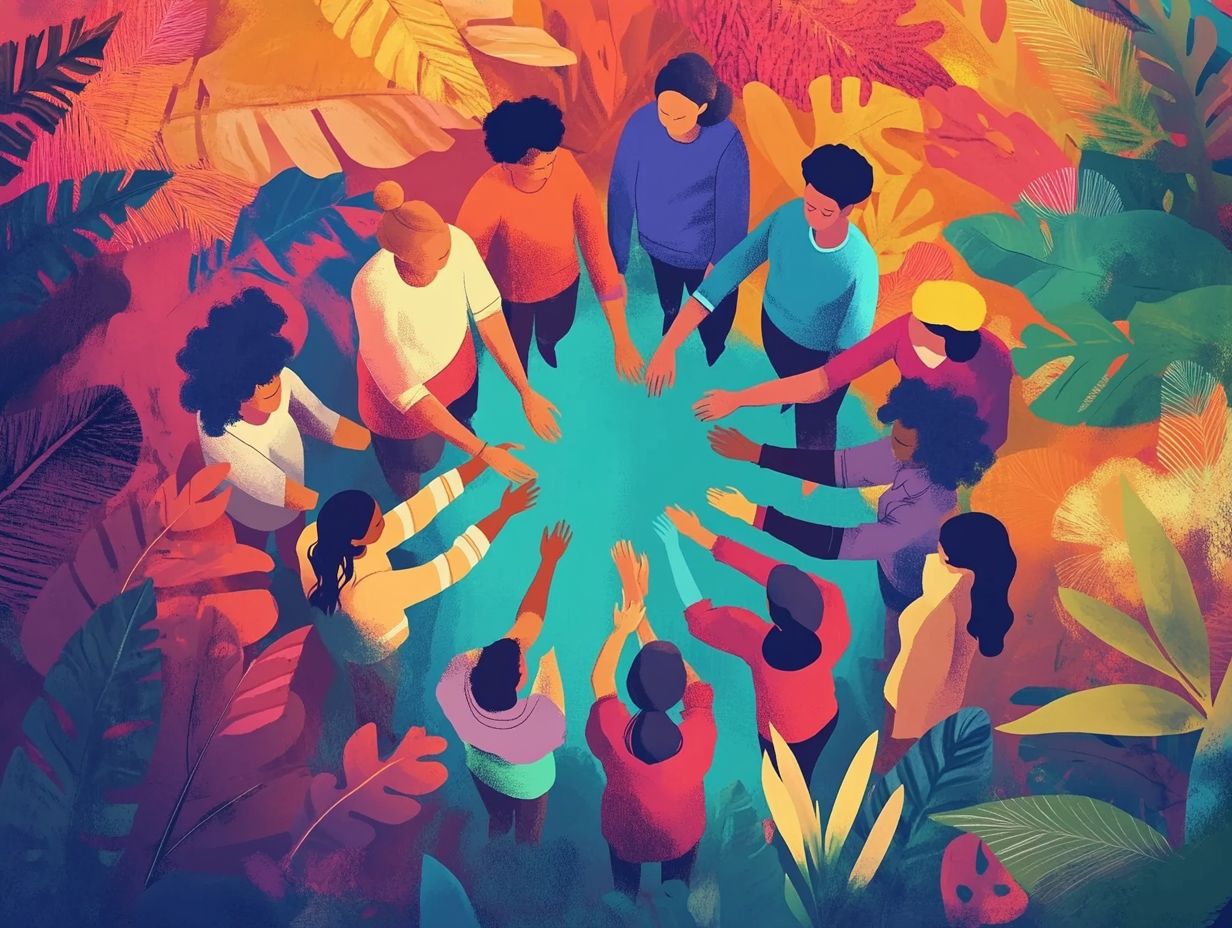The Connection Between Resilience and Empathy
In today’s fast-paced world, cultivating resilience and empathy is essential. These qualities not only help you navigate life’s challenges but also deepen your connections with others.
This discussion delves into the interplay between resilience and empathy, defining each trait while exploring how they influence one another. You ll discover practical strategies for developing both qualities, empowering you to enhance your emotional toolkit.
Join us on this exciting journey as we uncover the transformative power of resilience and empathy in your life.
Contents
- Key Takeaways:
- The Importance of Resilience and Empathy
- What is Resilience?
- What Is Empathy?
- The Impact of Resilience on Empathy
- Ways to Develop Resilience and Empathy
- Frequently Asked Questions
- What is the connection between resilience and empathy?
- How does being resilient affect one’s ability to empathize?
- Can empathy be learned and developed in individuals?
- In what ways can resilience and empathy be beneficial in our personal lives?
- How can the connection between resilience and empathy be beneficial in the workplace?
- Is there a downside to being both resilient and empathetic?
Key Takeaways:

- Resilience and empathy are interconnected, as resilience helps individuals empathize with others and understand their struggles.
- Resilience is the ability to bounce back from difficult situations, and it can lead to numerous benefits in personal and professional life.
- Empathy is the ability to understand and share the feelings of others, and it plays a crucial role in resilience by helping individuals build stronger connections and support systems.
The Importance of Resilience and Empathy
The importance of resilience and empathy in today’s world, particularly regarding mental health, cannot be overstated. These two qualities are intricately connected; resilience gives you the power to bounce back from challenges, while empathy nurtures understanding and connections.
In workplaces facing the reality of burnout, developing emotional skills is crucial.
Leaders like Tamar Chansky, along with organizations such as Catalyst and the Center for Creative Leadership, emphasize the necessity of compassionate support in creating an inclusive culture that values shared experiences and emotional understanding.
Together, resilience and empathy serve as the foundation of a thriving workplace community, enhancing employee satisfaction and facilitating trauma recovery.
Understanding the Connection
Understanding the connection between empathy and resilience is essential for fostering emotional well-being and nurturing supportive relationships in various contexts, including the connection between resilience and mental health.
By cultivating a profound sense of empathy, you can significantly boost your emotional intelligence, which serves as a vital foundation for effective communication and problem-solving. For example, in your workplace, an empathetic leader perhaps you will likely grasp your team’s emotional states more effectively, leading to more productive interactions and collaborative solutions during challenging projects.
In personal relationships, when you practice active listening and validation, you can resolve conflicts more easily. Embracing resilience strategies like mindfulness (the practice of being present and aware), stress management techniques, and seeking social support can be invaluable in both your personal and professional life.
These strategies give you powerful tools to handle stress and enhance your ability to navigate life’s challenges.
What is Resilience?
Resilience is your ability to bounce back swiftly from challenges; it encompasses emotional strength and adaptability in the face of adversity. By developing robust coping skills, you can manage stress effectively and navigate obstacles, which is vital for both personal growth and professional success.
Experts like Micah Kessel and institutions such as Harvard s Center on the Developing Child emphasize that resilience includes understanding your emotions and confronting any personal biases that might impede your progress.
Nurturing an inclusive culture that values resilience not only enhances your well-being but also fortifies community bonds and fosters a collective journey of growth.
Start developing your resilience and empathy today!
Defining Resilience and Its Benefits

Defining resilience means understanding its many benefits. This is especially true when it comes to boosting your emotional well-being and reducing issues like workplace burnout.
This remarkable ability to adapt and flourish under pressure nurtures a more positive mental state. It also strengthens social connections with your colleagues, fostering a supportive environment.
When faced with challenges such as tight deadlines or interpersonal conflicts resilient individuals often view these hurdles as opportunities for growth. They embrace a growth mindset, learning from their mistakes, which leads to innovative solutions and enhanced productivity.
By positively influencing their surroundings, resilient employees help to create a collaborative work culture. This culture uplifts overall morale and fortifies team dynamics, paving the way for improved communication and cooperation among peers.
What Is Empathy?
Empathy is the remarkable skill that allows you to understand and share the feelings of others. It serves as a cornerstone for emotional support and enriches your interpersonal relationships.
It is a crucial element of emotional intelligence, enabling you to engage in meaningful communications. This fosters deeper connections in both your personal and professional life.
Thought leaders like Michael Ventura and organizations such as Empathable highlight empathy’s significance in building inclusive workplaces where emotional well-being takes center stage.
By practicing perspective-taking and genuinely acknowledging the feelings of those around you, you create an environment that nurtures human connection and compassionate support.
Defining Empathy and Its Role in Resilience
Defining empathy and its role in resilience shows how these two elements intertwine. They enhance your emotional understanding and foster vulnerability.
When you practice empathy, you create a safe space for open dialogue. Sharing personal stories can help dismantle feelings of isolation.
Imagine facing a challenging life event, like the loss of a loved one; you may find comfort in a friend who listens and understands your grief without judgment. This emotional connection deepens your bond and bolsters your resilience by allowing you to process your feelings.
Research shows that being empathetic helps you handle life’s challenges better. This, in turn, promotes greater well-being and cultivates a genuine sense of belonging within your community.
The Impact of Resilience on Empathy
The impact of resilience on empathy reveals that building resilience significantly elevates your capacity to connect emotionally with others. This nurturing leads to a culture of compassionate support.
How Resilience Can Enhance Empathy

Resilience can greatly enhance your ability to empathize. It fosters an emotional strength that enables you to connect more deeply with others.
This emotional fortitude allows you to navigate challenges while remaining attuned to the experiences and feelings of those around you.
Engaging in resilience training can involve activities like mindfulness. This practice helps you cultivate awareness of your emotions and encourages a richer understanding of how others may feel.
Building supportive communities is essential in this journey. Collective experiences provide a shared foundation for empathy.
By exchanging stories and coping strategies, you strengthen your resilient qualities and expand your capacity for empathetic responses. This ultimately leads to more meaningful and compassionate interpersonal relationships.
Ways to Develop Resilience and Empathy
Cultivating resilience and empathy is vital for fostering emotional well-being. There are several effective strategies that can guide you in this transformative journey.
Start practicing empathy today! Discover the power of resilience and take action to enhance your emotional connections.
Practical Strategies for Building Resilience and Empathy
Now is the time to implement practical strategies to build resilience and empathy. These strategies can significantly enhance emotional support and effective communication within your team.
Cultivating a culture where individuals feel valued and understood elevates collaboration. This approach can significantly boost morale.
Key strategies include using things like mindfulness training to foster self-awareness. Promoting active listening techniques focuses on understanding each other’s perspectives.
Creating opportunities for open dialogue nurtures trust among team members. Engaging in community initiatives provides a much-needed sense of belonging while reinforcing shared values.
Encouraging feedback loops, where team members share thoughts and concerns, also supports resilience. These efforts ultimately drive a more resilient and empathetic work environment one that benefits both interpersonal relationships and overall performance.
Frequently Asked Questions
What is the connection between resilience and empathy?

The connection between resilience and empathy lies in their complementary roles in promoting emotional strength and understanding in individuals. Resilience helps individuals bounce back from adversity, while empathy allows them to understand and connect with others on a deeper level. Exploring the power of connection in building resilience can further enhance this understanding.
How does being resilient affect one’s ability to empathize?
Being resilient allows individuals to better handle their own emotions and experiences. This capability provides them with a greater capacity to understand and empathize with others.
When individuals are not overwhelmed by their own struggles, they can focus on the experiences of others.
Can empathy be learned and developed in individuals?
Yes, empathy can be learned and developed through practice and exposure to diverse perspectives and experiences. Building resilience helps develop empathy by enabling better emotional management.
In what ways can resilience and empathy be beneficial in our personal lives?
Having both resilience and empathy can greatly benefit individuals in their personal lives. Resilience helps individuals cope with challenges, while empathy allows them to build stronger connections with others.
How can the connection between resilience and empathy be beneficial in the workplace?
In the workplace, having resilience and empathy creates a more positive and collaborative work environment. Resilience helps individuals handle work-related stress, while empathy fosters better communication and understanding among colleagues.
Is there a downside to being both resilient and empathetic?
While resilience and empathy are generally positive traits, an excess of either can be detrimental. Too much resilience may lead individuals to suppress their emotions and avoid seeking help.
Conversely, excessive empathy can cause individuals to neglect their own well-being while prioritizing the needs of others.






